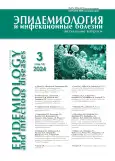Assessment of social and economic impact of the HIV/AIDS epidemic in Russia
- Authors: Nikolaeva N.А.1, Ladnaia N.N.2, Pomazkin D.V.3, Korotkikh A.M.1, Sanishvili T.T.1
-
Affiliations:
- Analytical Center under the Government of the Russian Federation
- Central Research Institute of Epidemiology, Russian Federal Service for Supervision of Consumer Rights Protection and Human Well-Being
- NPF GAZFOND
- Issue: Vol 14, No 3 (2024)
- Pages: 13-20
- Section: Problematic articles
- URL: https://journal-vniispk.ru/2226-6976/article/view/270313
- DOI: https://doi.org/10.18565/epidem.2024.14.3.13-20
- ID: 270313
Cite item
Abstract
Objective. Comprehensive assessment of the socio-economic consequences of the HIV epidemic in Russia.
Materials and methods. A methodology for modeling a comprehensive assessment of the socio-economic consequences of the HIV epidemic in Russia has been developed. The model is based on statistical data characterizing the trends in the development of the HIV epidemic in the Russian Federation. The socio-economic costs associated with HIV infection were estimated based on actual costs provided by the constituent entities of the Russian Federation. During the modeling, variant demographic assessments in accordance with 4 scenarios of the situation development depending on the level of coverage with treatment of people living with HIV (PLHIV) were made, and a forecast of socio-economic losses from HIV/AIDS in Russia was constructed.
Results. Due to the increase in the total number of PLHIV, the socio-economic losses from the HIV epidemic in Russia are growing. The total costs of the consolidated budgets of the constituent entities of the Russian Federation on the implementation of measures to counter the spread of HIV infection (taking into account inter-budget transfers from the federal budget) increased from 20.3 billion rubles in 2010 to 63.4 billion rubles in 2019. In 2019, the structure of costs was dominated by financing the purchase of antiretroviral drugs (46.3%) and the provision of medical care (30.1%), the proportion of costs on HIV prevention was insignificant (0.7%). According to the estimates obtained, the spread of HIV/AIDS in the territory of the Russian Federation can lead to significant demographic losses, estimated at 0.7–1.8 million people in 2019–2050, depending on the scenario.
Conclusion. The total costs of the consolidated budgets of the constituent entities of the Russian Federation on the implementation of measures to counter the spread of HIV infection increased by 3.1 times in 2019 compared to 2010. According to the assessment results, the implementation of scenarios providing for the coverage with antiretroviral therapy of 90-95% of HIV-infected people in Russia will save 800,000 – 1 million lives by 2050 and reduce the national economic burden of the HIV epidemic from approximately 4% to 3% of GDP in cumulative total. The process of HIV/AIDS spread has a high inertia, and the preventive measures taken today will have an impact with a noticeable delay.
Keywords
Full Text
##article.viewOnOriginalSite##About the authors
Natalya А. Nikolaeva
Analytical Center under the Government of the Russian Federation
Author for correspondence.
Email: iv_na@mail.ru
ORCID iD: 0009-0002-4411-8767
Cand. Econ. Sci., Head, Social Policy Department
Russian Federation, MoscowNatalia N. Ladnaia
Central Research Institute of Epidemiology, Russian Federal Service for Supervision of Consumer Rights Protection and Human Well-Being
Email: ladnaia@hotmail.com
ORCID iD: 0000-0003-2994-151X
Cand. Biol. Sci., Senior Researcher
Russian Federation, MoscowDmitry V. Pomazkin
NPF GAZFOND
Email: dmitri.pomazkin@mail.ru
ORCID iD: 0009-0000-2766-7807
Cand. Econ. Sci., Head, Development Programs Department
Russian Federation, MoscowAnna M. Korotkikh
Analytical Center under the Government of the Russian Federation
Email: annamk3781@gmail.com
ORCID iD: 0009-0007-9435-2670
Leading Analyst
Russian Federation, MoscowTamriko T. Sanishvili
Analytical Center under the Government of the Russian Federation
Email: tamriko.sanishvili@yandex.ru
ORCID iD: 0009-0005-7383-1627
Leading Analyst
Russian Federation, MoscowReferences
- Global HIV & AIDS statistics – 2020 fact sheet. UNAIDS, 2020. https://www.unaids.org/en/resources/fact-sheet
- The Impact of AIDS. United Nations Department of Economic and Social Affairs/Population Division, 2004. https://www.un.org/development/desa/ pd/sites/www.un.org.development.desa.pd/files/files/documents/2020/Jan/un_2004_impactaids.pdf
- Lamontagne E., Over M., Stover J. The economic returns of ending the AIDS epidemic as a public health threat. Health Policy 2019; 123(1): 104–8. doi: 10.1016/j.healthpol.2018.11.0075
- Sharp S. The Economic Impact if HIV and AIDS in Russia, Current Trends and Perspectives. UNDP, 2004.
- Покровский В.В., ред. ВИЧ-инфекция и СПИД. Национальное руководство. 2-е изд., перераб. и доп. М.: ГЭОТАР-Медиа; 2020: 90. Pokrovsky VV, ed. [HIV infection and AIDS. National Handbook. 2nd ed., rev. and add.]. Moscow: GEOTAR-Media; 2020: 90. (In Russ.).
- Global AIDS Update: Seizing the moment. Tackling entrenched inequalities to end epidemics. UNAIDS, 2020. 380 p. https://aids2020.unaids. org/report/
- Доклад по результатам исследования по оценке социально-экономических потерь общества от эпидемии ВИЧ/СПИД в России. Аналитический центр при Правительстве Российской Федерации. М., 2020. 264 с. [Report on the results of a study assessing the socio-economic losses of society from the HIV/AIDS epidemic in Russia]. Analytical Center for the Government of the Russian Federation. Moscow, 2020. 264 p. (In Russ.).
- Число зарегистрированных больных с впервые в жизни установленным диагнозом ВИЧ-инфекции, Российская Федерация, Росстат, 2021. https://www.fedstat.ru/indicator/41719 [Number of registered patients newly diagnosed with HIV infection, Russian Federation], Rosstat, 2021. (In Russ.). https://www.fedstat.ru/ indicator/41719
- Социально значимые заболевания населения России в 2019 году. Статистические материалы. М.: Министерство здравоохранения Российской Федерации, 2020. 77 с. [Socially significant diseases of the Russian population in 2019. Statistical materials]. Moscow: Ministry of Health of the Russian Federation, 2020. 77 p. (In Russ.).
- Ладная Н.Н., Покровский В.В., Козырина Н.В., Соколова Е.В., Дементьева Л.А. Смертность, связанная с инфекцией, вызываемой вирусом иммунодефицита человека, в Российской Федерации в 1987–2018 гг. Эпидемиол. инфекц. болезни. Актуал. вопр. 2020; 10(3): 54–62. doi: 10.18565/epidem.2020.10.3.54-62 Ladnaia N.N., Pokrovsky V.V., Kozyrina N.V., Sokolova E.V., Dementyeva L.A. [Human immunodeficiency virus-related mortality in the Russian Federation in 1987–2018]. Epidemiology and infectious diseases. Current items 2020; 10(3): 54–62. (In Russ.). doi: 10.18565/epidem.2020.10.3.54-62
- Результаты опроса «Средства, которые затрачивают люди, живущие с ВИЧ, для получения медицинского наблюдения в России». НПО «Пациентский контроль», 2020. https://pereboi.ru/2020/12/25/rezultaty-oprosa-sredstva-kotorye-zatrachivayut-lzhv/ [Results of the survey «Funds spent by people living with HIV to obtain linkage to care in Russia». NGO «Patient Control», 2020. (In Russ.). https://pereboi.ru/2020/12/25/rezultaty-oprosa-sredstva-kotorye-zatrachivayut-lzhv/
- ВИЧ-инфекция. Информационный бюллетень № 45. М., 2020. http://www. Hivrussia.info/wp-content/uploads/2020/12/Byulleten-45-VICH-infektsiya-2019-g..pdf [HIV infection. Information bulletin №. 45]. Moscow, 2020. (In Russ.). http://www.Hivrussia.info/wp-content/uploads/2020/12/Byulleten-45-VICH-infektsiya-2019-g..pdf
- UNAIDS Country factsheets. Russian Federation. UNAIDS. 2018. https://www.unaids.org/ru/regionscountries/countries/ russianfederation
Supplementary files












